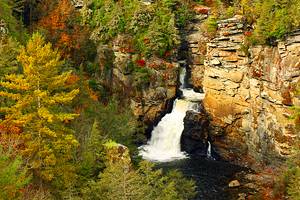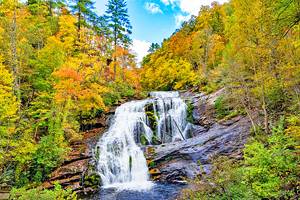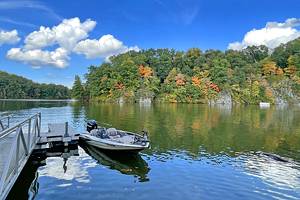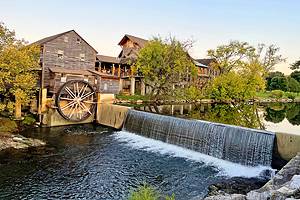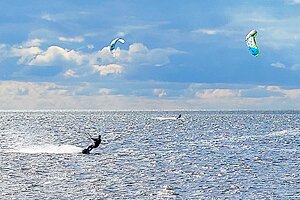Muskie Fishing on the French Broad River, North Carolina
The most important thing to understand about muskie fishing is that it is simultaneously the most frustrating and the most rewarding fishing experience that an angler can have at once. If you catch one, it's an all-out win with a bragging-rights photo that you will show for a lifetime. If you don't catch one, you walk away with an insatiable drive to try again with better knowledge and techniques for the next time.
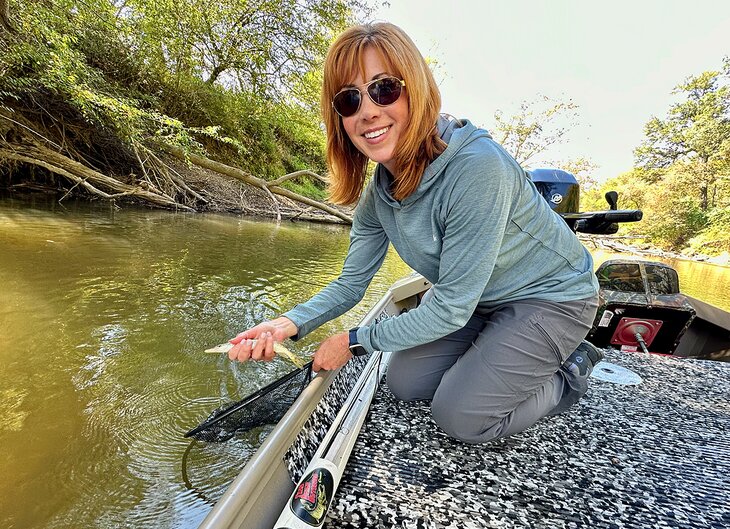
There's no way to sugarcoat that muskie is a species where the odds are stacked against you before you ever hit the water, which is why it is called the fish of 10,000 casts. The challenge of catching them is part of the reason they are such a bucket list species for so many anglers. You must earn the right to hold one.
With proper expectations in place, I set out for muskie fishing on the French Broad River in North Carolina near Hendersonville with my guide Stratton Hunter, owner of WNC Fish Hunter and a longtime member of the Western North Carolina Muskie Club.
The Muskellunge, or muskie as most people call them, are popular to fish for in some of the top fishing lakes in Wisconsin and other northern states like Ohio, so I was surprised to learn that they are also found in the French Broad River, one of the southern-most waterways to find them. It turns out that the cold mountain waters that flow into the French Broad River are what make it a prime habitat for muskies and worthy of angler's attention.
Muskie Prep
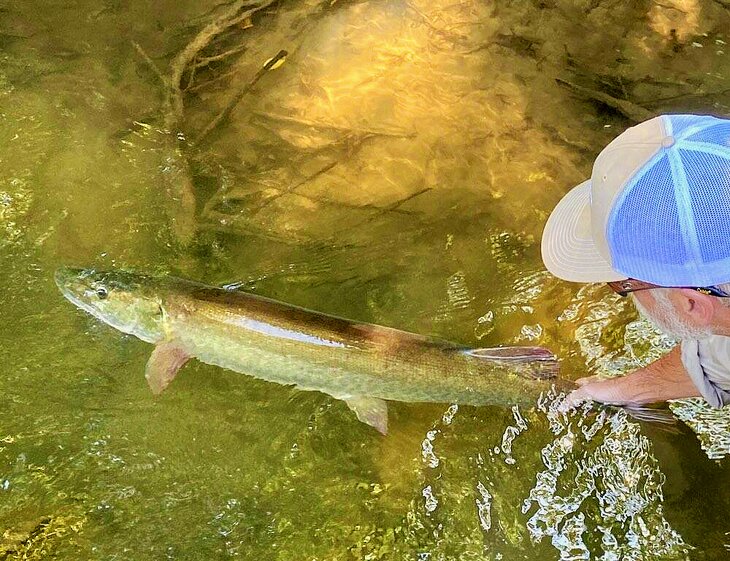
Before my day on the water, I meet Stratton Hunter at Hendersonville Outfitters which books guided trips, to go over our game plan for the next few days. Muskie fishing is quite physical from start to finish, so I plan my lodging nearby at a Brightwaters Vacation Rentals home making it easy to get to the boat ramp in the mornings, food in town after fishing, and for a short trip back in the evenings to recoup from what will be long days on the river.
We discuss the gear and consider factors like the time of year and water conditions. We will have both a spinning reel and a bait caster to use on the boat. Both are long rods, 8-and-8.5-feet needed to help with the figure-eight movement that completes the muskie lure retrieval alongside the boat. "Muskies are notorious for following a lure and not striking it. They want to get right up to it, look on both sides, and then once you start throwing in the figure eight and get a couple of rotations, hopefully, they'll grab it there," said Hunter.
In addition to the longer rods, we are using 65-pound braid and a variety of lures. Since it is early fall, we prep a selection of lures including small spinners (Mepps Muskie Killer), large blades (Double Cowgirl), ChatterBaits, glide baits (Hell Hound), and crankbaits. The sizes range from six to nine inches.
The lures we throw could change throughout the day to offer up varied options of color, vibration, and presentation methods as we try to draw the muskie out of the deep pools where they take cover.
We also prep a game-plan for proper fish handling if we catch one. Though muskies are top predators and quite aggressive, they're not bulletproof. It is important to get them into the large net as soon as possible, get the lure out, get a photo, and release them in the shortest amount of time possible.
Muskie Fundamentals
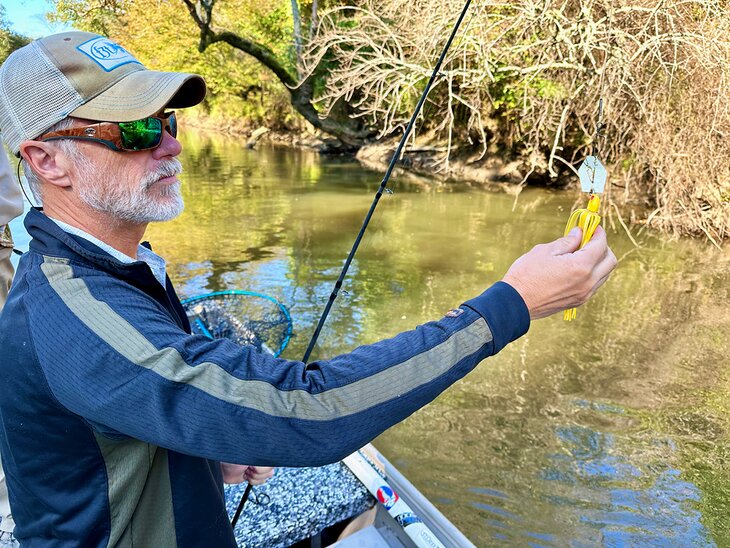
Understanding some basics about muskies can increase your chances of catching one and anglers need every advantage possible when it comes to this species.
First, it is important to understand the basic anatomy of the muskie. Unlike other fish, the dorsal fin of the muskie sits further back near its tail fin indicating that this fish is not designed for faster currents. They often sit on the bottom waiting for a meal to come by and then go out to grab it when they want it. This means targeting the deeper, slower pools that have some cover.
"There's plenty of food in this river so we make wise choices on throwing our lures at those spots," says Hunter.
Next, anglers want to avoid fishing for muskies during certain times of the year, like when they're spawning, or when temperatures get below 42 degrees, and their movements are slower.
Finally, gear selection changes throughout the year. In early spring and early summer, smaller lures like spinner blades are best. In the summertime, lures become more blade-oriented. And by the late summer, fall, and into early winter, your best bets are bigger lures because food sources have grown so you want to continue to increase the size of the lures you use to mimic the natural bait.
Time and Patience
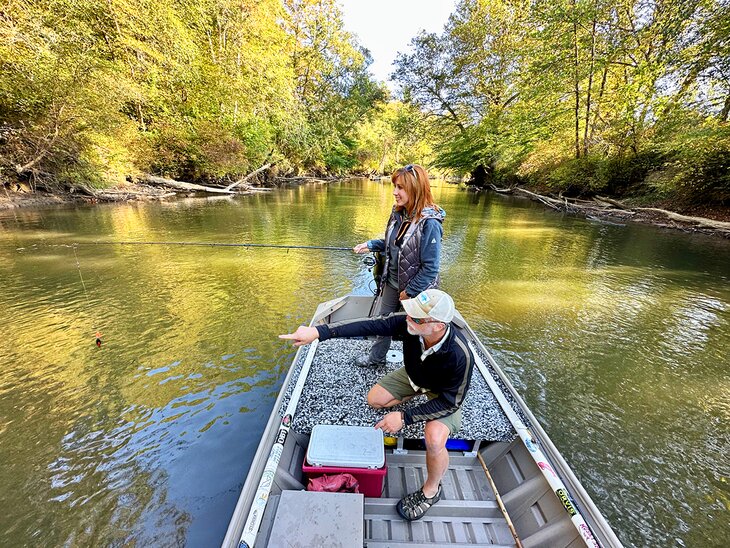
If you do the muskie math (and we did), putting the reputational 10,000 casts average into perspective, an angler will have to do nearly 2,000 casts a day during an eight- or nine-hour trip for five days straight for a single catch. You go into the battle knowing this challenge and I remind myself of this as a full day passes heading into a second day on the river casting lures repeatedly with no muskie interest.
"That's a little discouraging," Hunter tells me. "But you just got to keep the positive attitude and keep fighting the good fight and it will happen. It always happens. It's just putting the time in throwing the lures and keeping an eye out for the follow up." The follow up he refers to is that while most anglers will watch the lure coming towards the boat while retrieving it, they should be watching instead behind the lure as the muskie tends to watch it, stalk it, and follow it from a few inches away.
We hit every attractive "fishy looking" pool along the vast sections of the French Broad River. The water level is exceptionally low right now so the pools that had previously been successful at moving muskies are no longer even submerged. This means the fish have relocated elsewhere. As we navigate the boat around fallen trees on one of the oldest rivers in the world, it seems almost impossible to guess where the muskies might have moved as there are so many wonderful pools in this river system.
Casting begins to feel monotonous after so many hours, but I take Hunter's advice to make every cast count like each one is the first and present my lure with an expectation that this time could be the one where I see the big white shadow emerge from the dark water.
Moving a Muskie
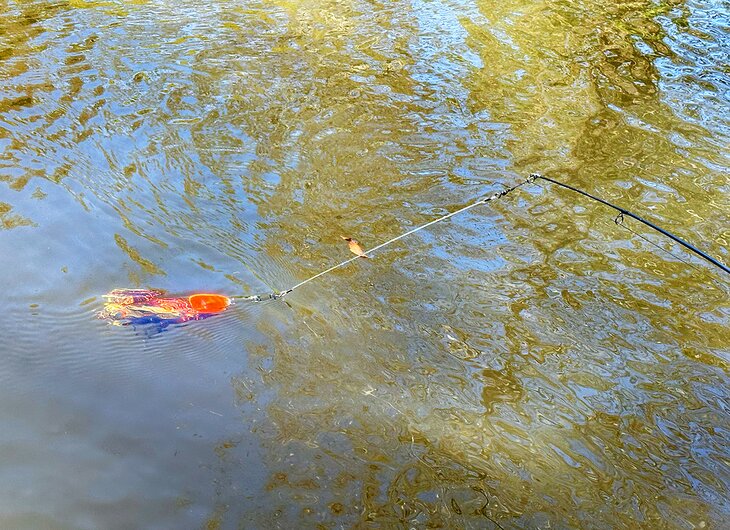
" A long, light, large presence suddenly appears following the lure...."
Somewhere close to noon on my second day on the river, something happened. While reeling in my bright green lure with its fluorescent color and stripes fluttering just beneath the surface of the water, I lead into my figure eight technique by the boat when I notice something emerging from the depths. A long, light, large presence suddenly appears following the lure. I can see its wide girth and its approximate four-foot length.
For sure, it is a massive muskie. Everything rests on what happens next.
When Hunter talks about moving a muskie, this is what he means – drawing it out from where it is holding tight and giving it enough of a reason to at least investigate potential food. Knowing the unpredictable and finicky nature of a muskie, this moment is like betting it all on the jackpot that will drastically pivot the day or the entire experience one way or the other.
"Now what?" I ask Hunter in a slightly desperate and panicked whisper.
"Just keep doing the figure eight and see if she goes for it," he responds.
Our voices drop from sharing great fishing stories in the boat to a full whisper and eventually just eye and gesture communication as we hold our collective breaths waiting for the T-bone attack of my lure that is the signature of muskie behavior. The shadow disappears, but she could easily be beneath the boat just watching and stalking the "grandma" lure I am using and deciding what to do next, or nothing at all.
Every ounce of energy is going into my repetitive figure eights by the boat, and nothing happens. Not wanting to give up, I must finally accept that the muskie is gone or just not interested. These are the heartbreaking moments that every muskie angler will experience and the ones that give this apex predator its well-deserved reputation.
"My heart skipped a beat," said Hunter. He is an expert having fished for muskies for many years and every encounter still brings an adrenaline rush.
Muskie fishing comes with so much to know about the species, their behavior, their habitats, and feeding habits but even if you think you've studied up on them enough, these fish are still consistently unpredictable. They require patience.
It is easy to let my guard down while casting over and over targeting the tiny deep pockets in slow-moving water as close to the bank as possible through partially submerged trees. Our additional challenge is the lowest water levels this river has experienced in many years making the targeted spaces more challenging to hit.
As we move down the river, casting into every pool, a muskie meet-up happens again with no warning. The same as before, a muskie emerges, examines the lure, and then swiftly slips back into the dark water as gracefully as it appeared.
Muskie Habitats
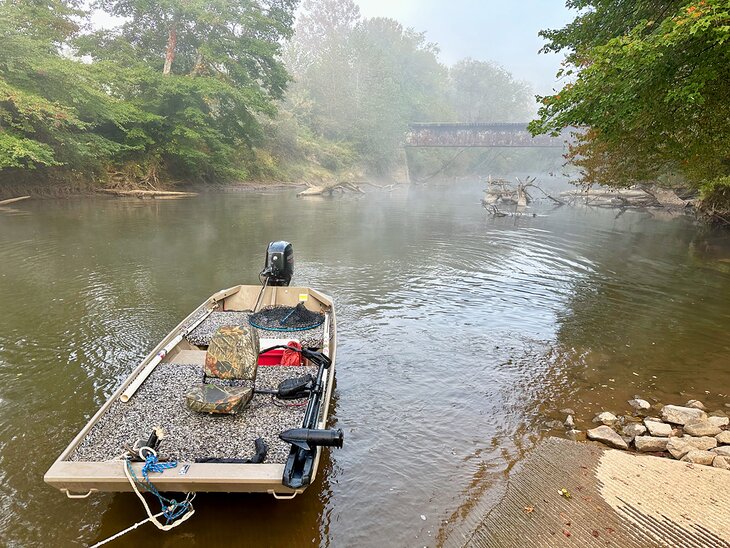
Tiger muskies are native to the French Broad River but over many years of habitat degradation, land use, sedimentation, and industrial discharge their populations were decimated. By the first half of the 20th century, muskies in the French Broad River were nearly extinct.
Several efforts underway to support muskie spawning and nursery habitat restoration are revitalizing populations.
The North Carolina Wildlife Resources Commission releases fingerlings that are raised at the Table Rock State fish hatchery each year into the French Broad River with the help of the Western North Carolina Muskie Club. These small muskies come from a native lineage from the French Broad River and other surrounding waterbodies.
They most recently stocked 550 muskie fingerlings with the hope that they eventually begin reproducing on their own. Another effort in place is the establishment of backwater muskie sloughs (pronounced SLOOS) by Conserving Carolina giving the muskies a safe place to spawn and enabling the fish to reproduce naturally.
Keep on Casting
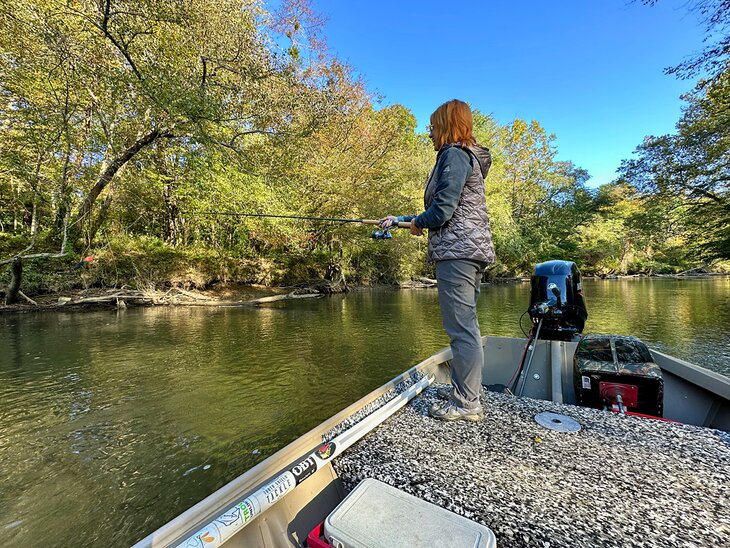
Repetition, patience, determination, and strategy are all part of the exhausting effort to catch a muskie, but when it happens it is a magical experience for any angler – one of a lifetime. While the elusive muskie will almost always outsmart you, anglers must position themselves with the best advantages possible, starting with hiring a reputable guide who is familiar with the local waters you are fishing.
Guides have history and experience on the waters and generally know from experience where to look for them. This is especially true on large river systems like the French Broad River.
"As guides, we tend to put more focus on those pools we have fished before to give our clients a better shot at fish. Guides know of pools where fish historically have been, so they know how to work them," said Hunter.
Despite the frustration – it is important to have fun with the experience.
"In this world, patience is a virtue. Don't give up. Stick with it. It will happen. Don't get discouraged. Enjoy your surroundings, the people you're with, and have a fun time out there throwing great lures fishing with good gear experiencing western North Carolina at its finest. Then if you do get that big hook up, it will change your world," said Hunter.
The thrill of appreciating that these giants lurk in the water and are healthy is reason enough to return and put in the time for the muskie reward.



